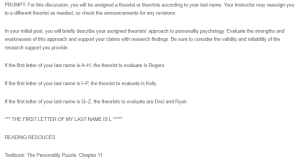Response – Carl Rogers’ Person-Centered Therapy
Response to Adalia Canfield
Hello Adalia,
Great job with your post. You provided an insightful overview of Carl Rogers’ person-centered therapy, particularly emphasizing its core strength in fostering a non-judgmental environment conducive to personal growth. As you mentioned, Rogers’ emphasis on the inherent drive for self-actualization aligns well with contemporary psychological practices that prioritize autonomy and personal agency (Yao & Kabir, 2023).
While Rogers is more fixated on feelings and interpersonal interaction in therapy, Kelly’s PCT could be a more formal approach to how one perceives the world and might be more suitable for specific cognitive therapies (Walker & Winter, 2023). However, it would be most beneficial to Rogers’ approach in therapeutic settings where the emphasis is placed on interpersonal rapport. However, suppose perseverance is important in a certain field. In that case, using information from the PCT of subjects like Kelly might be more useful in research conditions where the ability to comprehend what cognitive schemata people employ in certain situations is essential (Tsai & Tan, 2022).
Further, although both theories are useful, it appears that Kelly’s theory has more general implications for modern personality psychology, especially for cognitive studies and practice, while Rogers’ approach is still crucial for client-centred psychotherapy, emphasizing the aspects of empathy and change.
References
Tsai, A. Y. J., & Tan, A. Y. K. (2022). The Expanded Theory of Planned Behavior in the Context of Environmental Protection Behaviors for Undergraduates: Roles of Moral Norms and University Class Standings. International Journal of Environmental Research and Public Health, 19(15), 9256. https://doi.org/10.3390/ijerph19159256
Walker, B. M., & Winter, D. A. (2023). The Elaboration of Personal Construct Psychology. Annual Review of Psychology, 58(1), 453–477. https://doi.org/10.1146/annurev.psych.58.110405.085535
Yao, L., & Kabir, R. (2023, February 9). Person-Centered therapy (Rogerian therapy). PubMed; StatPearls Publishing. https://www.ncbi.nlm.nih.gov/books/NBK589708/
ORDER A PLAGIARISM-FREE PAPER HERE
We’ll write everything from scratch
Question
PROMPT: For this discussion, you will be assigned a theorist or theorists according to your last name. Your instructor may reassign you to a different theorist as needed, so check the announcements for any revisions.

Response – Carl Rogers’ Person-Centered Therapy
In your initial post, you will briefly describe your assigned theorists’ approach to personality psychology. Evaluate the strengths and weaknesses of this approach and support your claims with research findings. Be sure to consider the validity and reliability of the research support you provide.
If the first letter of your last name is A–H, the theorist to evaluate is Rogers.
If the first letter of your last name is I–P, the theorist to evaluate is Kelly.
If the first letter of your last name is Q–Z, the theorists to evaluate are Deci and Ryan.
*** THE FIRST LETTER OF MY LAST NAME IS L *****
READING RESOUCES
Textbook: The Personality Puzzle, Chapter 11
https://eds-p-ebscohost-com.ezproxy.snhu.edu/eds/detail/detail?vid=0&sid=6ac8760e-313a-4c92-be97-04d7fc90eb59%40redis&bdata=JnNpdGU9ZWRzLWxpdmUmc2NvcGU9c2l0ZQ%3d%3d#AN=34650475&db=cmedm

